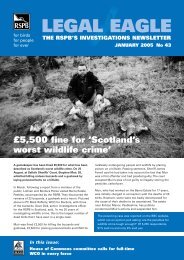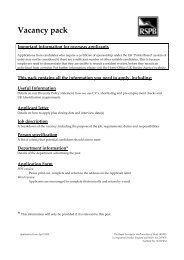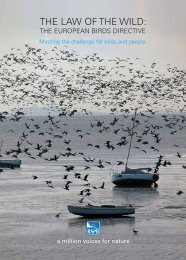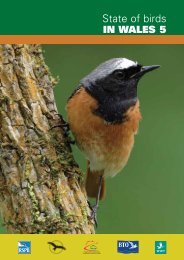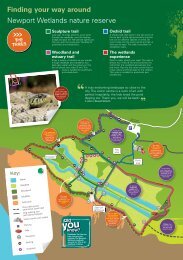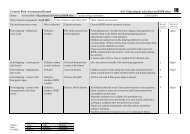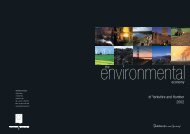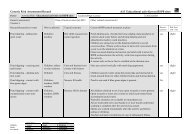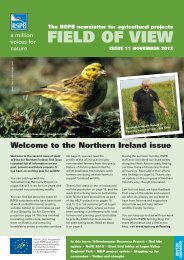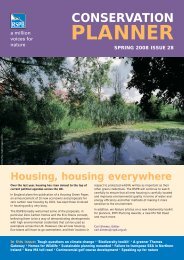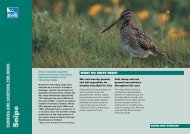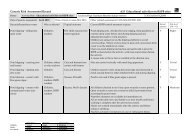Naturally, at your service: - RSPB
Naturally, at your service: - RSPB
Naturally, at your service: - RSPB
Create successful ePaper yourself
Turn your PDF publications into a flip-book with our unique Google optimized e-Paper software.
Ecosystem <strong>service</strong>s focus on the link between ecological processes and<br />
human wellbeing. The link between biodiversity and these processes is<br />
equally important in terms of n<strong>at</strong>ure conserv<strong>at</strong>ion, but the rel<strong>at</strong>ionship is, as<br />
yet, poorly understood.<br />
Biodiversity – the variety of life on<br />
earth – can be considered an<br />
ecosystem <strong>service</strong> in its own right<br />
because beautiful or inspiring<br />
species and living communities are<br />
valued by people for their sheer<br />
existence. Biodiversity also has<br />
value for the resources it harbours,<br />
which we have yet to study or<br />
exploit. The existence value of<br />
wildlife is amply demonstr<strong>at</strong>ed by<br />
the <strong>RSPB</strong> campaign to protect<br />
alb<strong>at</strong>rosses, which has, since 2005,<br />
raised over one million pounds<br />
from people, most of whom have<br />
never, and will never, actually see<br />
an alb<strong>at</strong>ross.<br />
Biodiversity also provides people<br />
with large cultural benefits. The<br />
millions of people who visit the<br />
countryside or coast to ‘experience<br />
n<strong>at</strong>ure’ demonstr<strong>at</strong>es this. Wildlife<br />
in gardens and parks is also an<br />
important source of inspir<strong>at</strong>ion and<br />
provides recre<strong>at</strong>ion and relax<strong>at</strong>ion.<br />
These benefits are clear to our<br />
million members and the many<br />
more who visit our reserves.<br />
However, biodiversity is about more<br />
than just the cultural <strong>service</strong>s or<br />
charism<strong>at</strong>ic species and inspiring<br />
landscapes. Less glorified elements<br />
of biodiversity, such as earthworms<br />
and soil microbes, are instrumental<br />
in shaping n<strong>at</strong>ure’s structure and<br />
processes. In this, biodiversity plays<br />
a fundamental role in providing the<br />
whole array of <strong>service</strong>s.<br />
But wh<strong>at</strong> level of biodiversity, in the<br />
broader sense of richness of<br />
number of species and number of<br />
individuals, is important? The<br />
rel<strong>at</strong>ionship between the overall<br />
diversity of species in an area or<br />
system, and the ecosystem<br />
processes, stability and<br />
provisioning <strong>service</strong>s th<strong>at</strong> result, is<br />
complex and poorly understood.<br />
Some species can apparently be<br />
lost without major impact on wider<br />
processes – or <strong>at</strong> least no impact<br />
th<strong>at</strong> is immedi<strong>at</strong>ely evident to<br />
people. Other species, however,<br />
clearly have keystone ecological<br />
st<strong>at</strong>us and their loss leads to<br />
cascading and even c<strong>at</strong>astrophic<br />
ecosystem effects. We cannot yet<br />
tell which species are critical to<br />
system processes in any general or<br />
reliable way. For this reason alone,<br />
humanity must always strive to<br />
prevent extinctions.<br />
Some evidence suggests th<strong>at</strong><br />
ecosystems with gre<strong>at</strong>er biological<br />
diversity might be more adaptable<br />
and resilient to stress, disease or<br />
external shocks. However, other<br />
evidence does not support this. The<br />
picture is far from simple and it is<br />
not possible to generalise. Our<br />
understanding of dynamic<br />
ecosystem processes, and how<br />
myriad species interact to produce<br />
them, is profoundly incomplete.<br />
David Tipling (rspb-images.com)<br />
Any assumption th<strong>at</strong> the delivery<br />
of regul<strong>at</strong>ory and supporting<br />
<strong>service</strong>s will autom<strong>at</strong>ically deliver<br />
n<strong>at</strong>ure conserv<strong>at</strong>ion objectives is<br />
a dangerous folly, which is likely<br />
to lead to the loss of many<br />
species and habit<strong>at</strong>s th<strong>at</strong> do not<br />
offer immedi<strong>at</strong>e and direct<br />
benefits to human wellbeing.<br />
We must improve our understanding<br />
of the rel<strong>at</strong>ionships between<br />
species, diversity and ecosystem<br />
<strong>service</strong>s through research. In the<br />
meantime, we must not fail to<br />
conserve and enhance the living<br />
diversity th<strong>at</strong> pervades and<br />
comprises these systems.<br />
19




